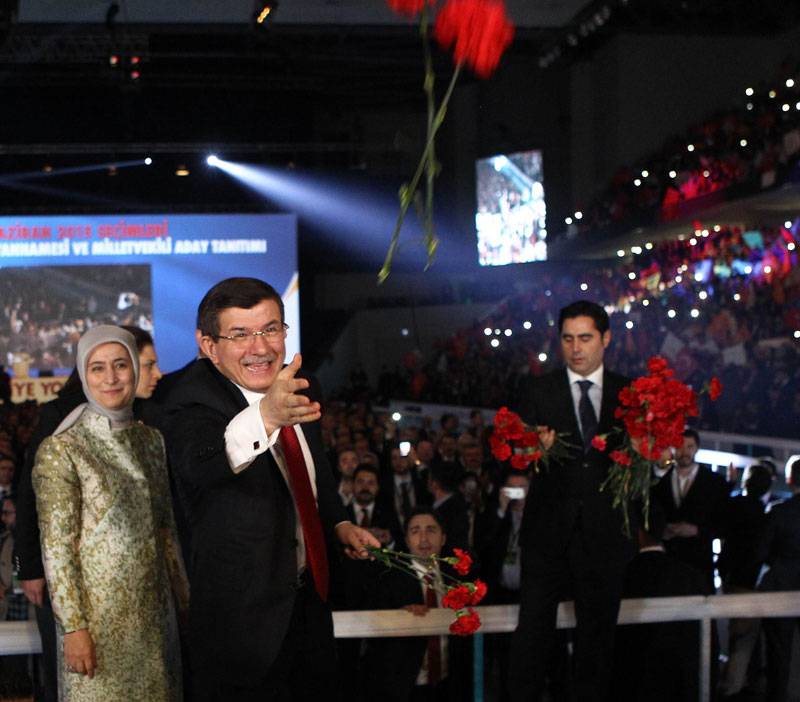ANKARA - Turkish Prime Minister Ahmet Davutoglu put a new constitution at the heart of his AK Party’s manifesto for a June election on Wednesday and said moving towards the presidential system coveted by President Tayyip Erdogan would be a priority.
The June 7 parliamentary poll could reshape the political landscape in the EU candidate nation, paving the way for Erdogan, who has dominated public life for more than a decade, to accumulate even greater powers.
An executive presidency akin to the US or French systems has become his greatest ambition, enshrined in a new constitution to replace a text born of a 1980 coup which, though revised, still bears the stamp of its military authors. “Parliament’s primary mission after the June 7 election is to write the country’s first civilian constitution in a spirit of compromise,” Davutoglu said at a party rally in Ankara.
“We see the restructuring of the administrative system towards a presidential system as necessary to clear up the mess over lines of responsibility and to genuinely restore accountability.”
Uncertainty over the outcome of the vote, as well as the accumulation of power by a leader who has already stamped his influence over the courts, the police and the media, has unnerved financial markets.
The lira plunged to the latest in a series of record lows against the dollar on Wednesday.
“Erdogan started as a reformer and has ended up power- rather than reform-focused,” said Lars Christensen, chief emerging markets analyst at Danske Bank in Copenhagen.
“Erdogan has not been a positive driving force for Turkish markets for the past few years. The reform phase effectively ended in 2006-7,” he said.
Erdogan, who founded the AKP in 2001 but had to step down as its leader when he won the presidency last August, has said he wants the AKP to win 400 seats in June, comfortably enough for the government to change the constitution unopposed.
It would need at least 330 seats to change the constitution and 367 to do so without the need for a referendum.
But five polling firms have predicted the AKP’s share of the vote will drop by between 1 and 8 percentage points from the 49.8 percent it garnered in 2011, potentially to a level that could force it to seek coalition partners.
“Erdogan’s persistence on the presidential system has no reciprocity in the votes ... It creates the impression of a different, more solitary regime, rather than a democracy,” Ozer Sancer, head of the Metropoll Research Center, told Reuters.
Past efforts to agree a new constitution have failed.
The fate of the Kurdish HDP opposition party will be critical, with all five pollsters putting it close to the 10 percent it would need to enter parliament. If it fails, its votes would be redistributed, favouring the AK Party.
Friday, April 19, 2024
Turkish PM puts new constitution

President calls for meaningful dialogue to end polarisation
April 19, 2024
KP minister briefed on issues about sales tax on services
April 19, 2024
64th anniversary of freedom fighter Mirzali Khan marked
April 19, 2024
893,000 students appear in SSC exams in KP
April 19, 2024
Hepatitis Challenge
April 18, 2024
IMF Predictions
April 18, 2024
Wheat War
April 18, 2024
Rail Revival
April 17, 2024
Addressing Climate Change
April 17, 2024
Justice denied
April 18, 2024
AI dilemmas unveiled
April 18, 2024
Tax tangle
April 18, 2024
Workforce inequality
April 17, 2024
New partnerships
April 17, 2024
ePaper - Nawaiwaqt
Advertisement
Nawaiwaqt Group | Copyright © 2024





